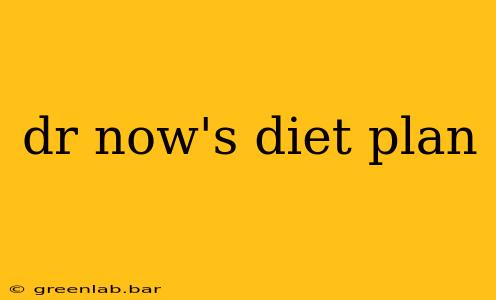Dr. Nowzaradan, renowned for his role in the popular TLC show My 600-lb Life, utilizes a strict, very-low-calorie diet plan as a crucial component of his weight-loss program. This isn't just a diet; it's a medically supervised approach designed to help morbidly obese individuals achieve significant weight loss before undergoing bariatric surgery. Understanding Dr. Now's diet plan requires recognizing its intensity, limitations, and the crucial role of medical supervision. This comprehensive guide breaks down the key aspects, offering insights into its effectiveness and potential challenges.
The Core Principles of Dr. Now's 1200-Calorie Diet
At its heart, Dr. Now's diet plan revolves around a drastically reduced calorie intake, typically around 1200 calories per day. This severe restriction is not intended as a long-term solution but rather a critical first step in preparing patients for weight-loss surgery and establishing healthier eating habits. The plan emphasizes:
1. Significant Calorie Restriction:
The 1200-calorie limit demands careful meal planning and portion control. This low calorie intake forces the body to utilize stored fat for energy, leading to significant weight loss. However, it’s important to understand that this is not sustainable in the long term and requires close monitoring by a medical professional.
2. Protein Emphasis:
Protein plays a vital role in Dr. Now's diet. High-protein intake helps preserve muscle mass during weight loss, which is crucial for maintaining metabolic function and overall health. Lean protein sources such as chicken breast, fish, and beans are preferred.
3. Limited Carbohydrates:
Carbohydrates are restricted to minimize insulin spikes and promote fat burning. Simple carbohydrates like sugary drinks and processed foods are strictly forbidden. Complex carbohydrates, such as whole grains (in moderation), are sometimes allowed but must be carefully monitored.
4. Healthy Fats in Moderation:
While fat is often demonized in dieting, Dr. Now's plan incorporates healthy fats from sources like avocados, nuts, and olive oil in limited quantities. These fats provide essential nutrients and contribute to satiety.
5. Strict Avoidance of Sugary Drinks and Processed Foods:
This is a cornerstone of the diet. Sugary drinks, fast food, and processed snacks are eliminated entirely due to their high calorie and low nutrient content. This elimination is vital for achieving the necessary calorie deficit.
Understanding the Limitations and Risks
It's crucial to understand that Dr. Now's diet plan is not suitable for everyone. This is an extremely restrictive diet requiring close medical supervision. Without proper monitoring, it can lead to serious health complications, including:
- Nutrient Deficiencies: The severe calorie restriction can lead to deficiencies in essential vitamins and minerals.
- Muscle Loss: While protein intake aims to mitigate this, muscle loss can still occur if not properly managed.
- Metabolic Slowdown: The body can adapt to the low calorie intake, slowing metabolism and making further weight loss challenging.
- Electrolyte Imbalances: These can be life-threatening if not carefully monitored.
The Importance of Medical Supervision
The 1200-calorie diet should only be undertaken under the direct supervision of a medical professional. Dr. Now's success hinges on his personalized approach and rigorous monitoring of patients' health. He regularly adjusts the plan based on individual needs and progress, addressing potential complications promptly. Attempting this diet without medical guidance is extremely dangerous and could have severe health consequences.
Conclusion: A Powerful Tool, but Not a DIY Solution
Dr. Now's 1200-calorie diet plan is a powerful tool for significant weight loss in individuals with morbid obesity, but it's a demanding and potentially risky approach. It's designed as a crucial first step in a comprehensive weight-loss journey that involves medical supervision, lifestyle changes, and potentially bariatric surgery. The information provided here is for educational purposes only and should not be interpreted as medical advice. Always consult a healthcare professional before making significant dietary changes.

